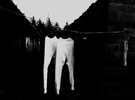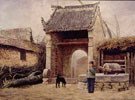“Global Queering”
Dennis Altman observes the dissemination of a Euro-American type of gay identity all around the world. He addresses the globalization of sexual identities and calls for global sexual politics. Indeed, LGBTQ politics has been an important component of international relations and transnational politics, as in the case of the “Gay International.” In today’s China, LGBTQ identity and politics are subject to various transnational forces, from media to popular culture, from transnational LGBTQ movements to international travels, from global medical governmentality on HIV/AIDS to transnational pink economy. Indeed, same-sex desires in China are global.
But the LGBTQ identity in China is also distinctively Chinese. It has a specific history and is embedded in its particular social and cultural context. The contemporary Chinese LGBTQ identity is influenced by ideologies and practices of sex and sexuality from pre-modern China, the Republican era, the Maoist era and the Reform era. Each historical period has left its imprints on today’s LGBTQ identities and desires.
We should caution against the “global queering” thesis and the “Chinese” gay identity thesis. In fact, Chinese gay identity is both global and local, both transnational and national. It is an assemblage of different images and imaginaries from different times and locations, and from different sources, including media, popular culture, human rights discourse, medical discourses, and the state law and regulation.
Suffice it to say here that the same-sex desire is deeply intertwined with Chinese modernity. The emergence of “same-sex love” symbolised the disruption of knowledge and cosmology that had existed in pre-modern China for thousands of years by the modern scientific knowledge introduced from the West via transnational cultural flows in Asia. The May Fourth intellectuals’ enthusiasm for translating and discussing homosexuality expressed their imagination of, and desire for, a modern nation. Mao opened up an imaginary of the socialist modernity through revolutionary hegemony. Subject formation in the Maoist era was closely intertwined with a particular construction of gender and sexuality. In the Reform era, the emergence of the LGBTQ identity has become a trope for a more open and liberal China, with its entry into the global economy. In a sense, gay identity in the post-Mao China marks a departure from the Maoist subjectivity that celebrates China’s coming to terms with transnational capitalism and neoliberalism.
However, there are serious discontents with this “global gay” identity. The spectres of “cut sleeve”, “same-sex love”, and “comrade” still haunt the seemingly seamless and utopian dream of the “global gay” identity. Today’s LGBTQ culture in China is predominantly urban, middle-class and cosmopolitan. It excludes people from the countryside and from undeveloped regions, people who are open in sex and relationship, people with different expressions of gender, and people who engage in commercial sex. The rhetoric of suzhi (quality) in LGBTQ community serves state governmentality and reinforces social hierarchy. Chinese gay identity is as exclusive as it is inclusive. It bears witness to a society that is penetrated by global capitalism and that undergoes rapid social changes, and to the volatile bodies, desires and identities that live through China’s unfolding history.
1. Dennis Altman, Global Sex (Chicago: University of Chicago Press, 2001); Jon Binnie, The Globalization of Sexuality. (London: SAGE, 2004); Arnaldo Cruz and Martin F. Manalansan. Queer Globalizations: Citizenship and the Afterlife of Colonialism, Sexual Cultures. (New York: New York University Press, 2002).
2. Jurgen Habermas,The Structural Transformation of the Public Sphere: An Inquiry into a Category of Bourgeois Society (Cambridge: Polity Press, 1992); Michael Warner, Publics and Counterpublics (New York: Zone Books 2002).
3. Note on transliterations: I use the Hanyu Pinyin system of transliteration for Chinese words, names and phrases, except in cases where a different conventional or preferred spelling or pronunciation exists (e.g. Chou Wah-shan). The ordering of Chinese names follows their conventional forms, that is, surnames first, followed by first names.
4. In this article, I use homoeroticism, same-sex eroticism, same-sex intimacy, homosexuality, gay, tongzhi, queer, LGBTQ to refer to same-sex desire for different reasons. Generally speaking, I use homoeroticism, same-sex eroticism, same-sex intimacy in pre-modern Chinese context and in a more general sense that does not indicate any fixed modern identity category. I use homosexuality, gay, tongzhi, queer, LGBTQ to refer to same-sex desire in a specific historical and social context, and I will demonstrate the necessity of using these different terms in this article through a historical approach.
5. Adrian Carton, “Desire and Same-Sex Intimacies in Asia,” in Gay Life and Culture: a World History, ed. Robert Aldrich (New York: Universe, 2006), 303.
6. Egalitarian same-sex intimacy between males was also found in pre-modern China. It mostly occurred in imperial court culture and among elite literati and took the form of male friendship or brotherhood. See Bret Hinsch, Passions of the Cut Sleeve: the Male Homosexual Tradition in China (Berkeley: University of California Press, 1990), 13.
7. For an explanation of these historical anecdotes, see Hinsch, Passions of the Cut Sleeve, 20-54; Zhang Zaizhou, Aimei de licheng: zhongguo gudai tongxinglian shi [An ambiguous intimacy: history of homoeroticism in pre-modern China] (Zhengzhou: Zhongzhou guji chubanshe, 2001), 10-11.
8. The differentiation between “sexual act” and “sexual identity” in Chinese context was discussed by Song Hwee Lim in his Celluloid Comrades: Representations of Male Homosexuality in Contemporary Chinese Cinemas (Honolulu: University of Hawai’i Press, 2006), 7-13. “The distinction between sexual acts and sexual identities is not so much that the former is ‘what one does’ and the later is ‘what one is’ (to borrow Hirsch’s phrases), rather, the very concepts of act and identity must be seen as the effects of sexual discourses that not only distinguish one from the other, but also, by mobilizing this distinction, impose an arbitrary marker that separates the two concepts as mutually exclusive.” (Lim, Celluloid Comrades, 9, original emphasis)
9. For a critique of the tolerance of homoeroticism in pre-modern Chinese Society, see Liu Jen-peng and Ding Naifei, “Reticent Poetics, Queer Politics,” Inter-Asia Cultural Studies 6, no. 1 (2005): 30-55; Fran Martin, Situating Sexualities: Queer Representations in Taiwanese Fiction, Film and Public Culture (Hong Kong: Hong Kong University Press, 2003), 32-33; 201-203;233-234; Zhang Zaizhou, Aimei de licheng.
10. Historical records of same-sex eroticism between women were scant. See Hinsch, Passions of the Cut Sleeve, 173-178; Tze-lan D. Sang, The Emerging Lesbian: Female Sex-Sex Desire in Modern China (Chicago: the University of Chicago Press, 2003), 37-95.
11. Carton, “Desire and Same-Sex Intimacies in Asia”, 309-311. Also see Charlotte Furth, A Flourishing Yin: Gender in China’s Medical History (Cambridge, M.A.: Harvard University Press, 1998); Robert Hans van Gulik, Sexual Life in Ancient China: A Preliminary Survey of Chinese Sex and Society from ca 1500 B.C. till 1644 A.D. (Leiden: E.J. Brill, 1974).
12. For the argument of the disruption of Chinese homoerotic traditions by the West, see Xiaomingxong [Samshasha], Zhongguo tongxing’ai shilu [History of Chinese homosexuality] (Hong Kong: Fenhong sanjiao chubanshe, 1984); Chou Wah-shan, Tongzhi: Politics of Same-Sex Eroticism in Chinese Societies (New York: the Haworth Press, 2000), 42-55. For a critique of the argument, see Liu Jen-peng and Ding Naifei, “Reticent Poetics, Queer Politics,” 30-55; Fran Martin, Situating Sexualities.
13. In mainland China during the post-Mao period, the scholarly reconstruction of pre-modern sex and sexualities as ars erotica was closely linked to a rising nationalism and a conscious departure from the Maoist past. See Judith Farquhar, Appetites: Food and Sex in Post-Socialist China (Durham, Duke University Press, 2002), 243-284.
14. Sang, The Emerging Lesbian, 23.
15. Scientia sexualis (xing kexue) and ars erotica (xing yishu) are terms that Michael Foucault uses to designate different ways of understanding sexuality. See Michel Foucault, The History of Sexuality, vol. 1. (London: Penguin Books, 1990), 51-73.
16. Sang, The Emerging Lesbian, 99-126.
17. Wenqing Kang, Obsession: Male Same-Sex Relations in China, 1900-1950. (Hong Kong: Hong Kong University Press, 2009).
18. Howard Chiang, “Epistemic modernity and the emergence of homosexuality in China,” Gender and History, 22, no. 3. (2010).
19. Please note that jinjian was a term borrowed from the legal codes in pre-modern China. It did not have a Biblical reference. See Guo Xiaofei, Zhonggguofa shiye xiade tongxinglian [Homosexuality under the gaze of Chinese law] (Beijing: Zhishi chanquan chubanshe, 2007), 15-20. For a detailed explanation of liumang, see Michael Dutton, Streetlife China (Cambridge: Cambridge University Press, 1998), 62-75.
20. Emily Honig, “Socialist Sex: The Cultural Revolution Revisited,” Modern China 29, no. 2 (2003): 143-175.
21. As Eve Sedgwick argues, queer denotes “the open mess of possibilities, gaps, overlaps, dissonances and resonances, lapses and excess of meaning [that occur] when the constituent elements of anyone’s gender, or anyone’s sexuality aren’t made (or can’t be made) to signify monolithically.” Eve Kosofsky Sedgwick, Tendencies (Durham: Duke University Press, 1993), 9.
22. Li Yinhe and Wang Xiaobo, Tamen de shijie: zhongguo nan tongxinglian qunluo toushi [Their world: a perspective on Chinese gay community] (Hong Kong: Tiandi tushu youxian gongsi, 1992; Taiyuan: Shanxi renmin chubanshe, 1993); Liu Dalin, Zhongguo dangdai xingwenhua: zhongguo liangwenli xingwenming diaocha [Sex culture in China today: report on 20,000 cases of “sexual civilization”] (Shanghai: Sanlian shudian, 1992); Zhang Beichuan, Tongxing”ai [Homosexuality] (Ji”nan: Shandong kexue jishu chubanshe, 1994); Fang Gang, Tongxinglian zai zhongguo [Homosexuality in China] (Changchun: Jilin renmin chubanshe, 1995). For information of Pan Suiming’s and Lu Longguang’s research on homosexuality in the 1980s and 90s, see Liu and Lu, Zhongguo tongxinglian yanjiu [Study of homosexuality in China] (Beijing: Zhongguo shehui chubanshe, 2006), 38-39.
23. I have mainly focused on gay male sexual identity in this article. For information about lesbians in the Chinese-speaking world, see Elisabeth Lund Engebretsen, “Lesbian Identity and Community Projects in Beijing: Notes from the Field on Studying and Theorising Same-Sex Cultures in the Age of Globalisation,” Permanent Archive of Sexualities, Genders, and Rights in Asia: 1st International Conference of Asian Queer Studies (2005), http://bangkok2005.anu.edu.au/papers/Engbretsen.pdf. (accessed June 1, 2010); Helen Hok-Sze Leung, Undercurrents: Queer Culture and Postcolonial Hong Kong (Vancouver: UBC Press, 2008); and Fran Martin, Backward Glances: Contemporary Chinese Cultures and the Female Homoerotic Imaginary (Durham: Duke University Press, 2010).
24. The 1997 Chinese Criminal Law deleted liumangzui, which was considered by the Chinese LGBT community to be the “decriminalization” (feizuihua) of homosexuality. Legal studies scholar Guo Xiaofei points out that the so-called “decriminalization” of homosexuality was an unexpected outcome resulted from the deletion of liumangzui, although the issue of decriminalizing homosexuality might not have been the intention of the legislators. He further points out that homosexuality had never been criminalized in legal texts in the People’s Republic of China, although the law in action might have been different. For more discussions about homosexuality in Chinese law, see Guo Xiaofei, Zhongguo fa shiye xiade tongxinglian [Homosexuality in the gaze of Chinese law] (Beijing: zhishi chanquan shubanshe, 2007); Zhou Dan. Aiyue yu guixun: zhongguo xiandaixing zhong tongxing yuwang de fali xiangxiang [Love and discipline: juridical imaginations of same-sex desires in Chinese modernity] (Guilin: Guangxi shifan daxue chubanshe, 2009). Regarding the ‘depathologization’ of homosexuality, CCMD–3 stipulates that only those who are not ‘self-harmonious’ (ziwo hexie) with their sexual identities need seeking psychological and medical treatment. For an example of medical treatment of homosexuality with aversion therapy, see Liu Dalin and Lu Longguang, Zhongguo tongxinglian yanjiu [Studies on Chinese Homosexuality] (Beijing: Zhongguo shehui chubanshe, 2005), 231-328.
25. For more discussions about LGBTQ community issues in contemporary China, see Bao Hongwei, “LGBT Issues in China,” in The Greenwood Encyclopaedia of LGBT Issues Worldwide, ed. Chuck Steward (Santa Barbara, CA: ABC CLIO, 2010): 355-73.
26. Apart from gay, tongxinglian and tongzhi, there are also other types of same-sex subjects in contemporary China. See, for example, Wei Wei’s study on piaopiao, a type of indigenous same-sex subject in Chengdu in Southwest China. Wei Wei. “‘Wandering Men’ No Longer Wander Around: The Production and Transformation of Local Homosexual Identities in Contemporary Chengdu, China,” in Inter-Asia Cultural Studies 8, no. 4 (2007): 572-588.
27. For the origin of the term tongzhi in the LGBTQ context, see Song Hwee Lim, Celluloid Comrades, 11-12.
28. Chou, Tongzhi, 1-9.
29. Gao Yanning, “Zhongguo you gay ma? tongzhi yu gay/ lesbian de kuawenhua bijiao” [Are There Gay People in China? A Cross-cultural Comparison between Tongzhi and Gay/Lesbian], in Conference Proceedings of the National Conference on HIV/AIDS Prevention and Treatment among Men Who Have Sex with Men / the Tenth Anniversary Celebration of Friends Project/ Barry & Martin Prize-Giving Ceremony, ed. Friends Project (Qingdao: Pengyou xiangmuzu, 2009), 197.
30. For a discussion of the politics of the mask and xianshen (to reveal oneself; to come out) in Taiwanese society, see Martin, Situating Sexualities, 187-235.
31. My discussion of the tongzhi identity and politics are inspired by two sources of literature: first, writings, mainly on non-Western sexualities, including Chris Berry, “Sexual Disorientations: Homosexual Rights, East Asian Cinemas, and Postmodern Postnationalism,” in Pursuit of Contemporary East Asian Culture, ed. Xaobing Tang and Stephen Snyer (oulder, CL: Westview Press, 1996);157-82; Chou Wah-shan, Tongzhi; Elisabeth Lund Engebretsen, “Queer Ethnography in Theory and Practice: Reflections on Studying Sexual Globalisation and Women's Queer Activism in Beijing,” Graduate Journal of Social Science 5, no. 2 (2008): 88-116; Loretta Wing Wah Ho. Gay and Lesbian Subculture in Urban China (London: Routledge, 2010); Travis Kong, Chinese Male Homosexualities: Memba, Tongzhi, and Golden Boy. (London: Routledge, 2010); and Lisa Rofel, Desiring China: Experiments in Neoliberalism, Sexuality, and Public Culture (Durham: Duke University Press, 2007). Second, writings on gender performativity, queer sociality, kinship and intimacy in the field of queer studies, including Lauren Berlant, Intimacy. (Chicago: University of Chicago Press, 2000); Judith Butler, Gender Trouble: Feminism and the Subversion of Identity (New York: Routledge, 1990); Elizabeth Freeman, The Wedding Complex: Forms of Belonging in Modern American Culture (Durham: Duke University Press, 2002); and Eve Kosofsky Sedgwick, Epistemology of the Closet. (Berkeley: University of California Press, 1990).
32. Dennis Altman, Global Sex (Chicago: University of Chicago Press, 2001).
33. Joseph A. Massad, Desiring Arabs (Chicago: University of Chicago Press, 2007), 160-190.
34. For a discussion of suzhi (quality) in Chinese gay community, see Lisa Rofel, Desiring China, 85-110; and Loretta Ho, Gay and Lesbian Subculture in China, 89-97.




